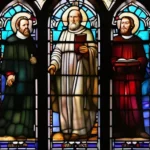Explore the unique aspects of covenant theology and how it sets itself apart from other religious beliefs.
Covenant theology is a system of Christian theology that emphasizes God’s relationship with humanity through a series of covenants. In this article, we will delve into what makes covenant theology distinct from other religious beliefs and explore its key tenets.
The Foundations of Covenant Theology
What makes covenant theology distinct from other religious beliefs, especially within Christianity? To understand this, we must first delve into the foundational principles that set it apart. The concept of covenant is central to covenant theology, acting as a metaphor for understanding God’s relationship with humanity throughout history.
A covenant, in theological terms, can be likened to a binding agreement or contract between two parties. In this case, one party is God, and the other could be individuals, a nation, or even all of humanity. For instance, consider the Abrahamic Covenant—a promise made by God to Abraham that his descendants would inherit the land of Canaan. This covenant sets a precedent for how God establishes relationships based on trust and commitment.
Covenant theology sees these covenants as progressive, meaning they build upon each other, revealing more about God’s character and plans over time. Each covenant serves not just to replace previous ones but to add depth and nuance. For example, the Mosaic Covenant at Sinai, while replacing the Abrahamic Covenant for a specific period, still finds its fulfillment in Christ.
This progressive nature of covenants is what sets covenant theology apart. Unlike some other systems that might view each covenant as independent or even contradictory, covenant theology sees them as interconnected and integral parts of God’s overarching plan. This perspective provides a more cohesive understanding of scripture and the relationship between God and humanity.
Covenant Theology vs. Other Systems of Christian Theology
Covenant Theology vs. Other Systems of Christian Theology: A Comparative Look
Imagine a garden where various theological paths lead to God, each offering unique flowers and insights. Among these, Covenant Theology stands out like a vibrant red rose, its petals carefully layered with rich symbolism. But why does this particular theological path seem so distinct from others? Let’s dive into the heart of Covenant Theology and explore what makes it stand apart.
One key difference lies in how Covenant Theology views the relationship between God and humanity. Unlike some systems that focus narrowly on individual salvation, Covenant Theology sees a broader narrative where God has entered into a series of agreements or covenants with His people. This perspective changes our understanding of history, not just as a series of events but as a story woven together by divine promises.
Consider the metaphor of a river. In some theological paths, this river might seem like a swift current that occasionally dries up, leaving individuals to fend for themselves. But in Covenant Theology, it’s more like a steady stream, where God’s faithful presence is felt throughout history. From the Abrahamic covenant to the New Testament, each step is seen as part of an ongoing relationship.
Another distinguishing feature is its emphasis on continuity and discontinuity within these covenants. While some might see the transition from one era to another as a complete break, Covenant Theology often views it through the lens of God’s unchanging nature—like a consistent thread running through different fabrics of history. This approach highlights both the similarities and differences between covenants, revealing a complex yet coherent narrative.
So why does this matter? It matters because understanding these distinctions helps us appreciate the depth and complexity of our relationship with God. It’s like looking at a painting from various angles; each perspective reveals new layers of meaning that enrich our spiritual journey.
In essence, Covenant Theology is distinct because it invites us to see God’s plan for humanity as a grand, interconnected story rather than isolated events. This unique viewpoint not only deepens our faith but also challenges us to live in light of the covenantal promises we hold dear.
The Two Main Covenants in Covenant Theology
Imagine two rivers running parallel, one representing covenant theology and the other symbolizing various other religious beliefs. In covenant theology, we find two main streams: the covenant of works and the covenant of grace. These covenants are like the bedrock upon which much of Reformed theology is built, setting it apart from other systems of Christian thought.
The covenant of works, often seen as a challenge in this metaphorical landscape, is like a narrow path leading to a steep cliff. It sets an impossible task for humanity, demanding perfection to reach its summit. In contrast, the covenant of grace flows more freely and gently, providing a broader, easier route through divine mercy and forgiveness.
Here’s where things get interesting: in covenant theology, these two covenants are not just separate streams but interconnected tributaries that form the larger river. The covenant of works is seen as an early attempt to establish human righteousness before God, laid down at the beginning of human history (Gen 2:17). This covenant was based on the impossible condition of perfect obedience, a task beyond any human capability.
The covenant of grace, however, is like the calm waters that flow after the raging torrent. It offers salvation through faith in Christ alone, not by our own works (Eph 2:8-9). This covenant was established after the fall, providing a new relationship with God based on His mercy and grace.
These two covenants illustrate how covenant theology grapples with the realities of human nature and God’s sovereignty. They provide a framework for understanding redemption, salvation, and the ongoing relationship between believers and God. By exploring these concepts, we can gain deeper insights into why covenant theology stands out in its approach to faith and practice.
The Covenant of Works
Imagine covenant theology as a grand symphony, where each note and chord resonates to create a harmonious whole. Among its many movements, the covenant of works plays a crucial role, but it’s a melody that quickly becomes complex when we dive into its depths.
In this covenant, God presents humanity with a series of terms, akin to a contract. The terms are clear and unambiguous: do as I command, and you will receive life. This covenant is often referred to in religious texts as the law, which outlines the conditions for salvation through works.
The question arises: can humanity ever fulfill these terms? It’s like trying to reach the summit of Mount Everest without any gear or support; it’s simply beyond human capability. The covenant of works sets a standard that, in its perfection, is unattainable by sinful human nature. This impossibility highlights the depth of our sin and the severity of our need for grace.
Consider this: if we could keep these terms, why do we still fall short? Why are there broken laws in our lives, even when we try to follow them meticulously? The answer lies not in human effort but in God’s provision. The covenant of works points us to the reality that we need something more than our own efforts; we require a mediator who can fulfill these terms on our behalf.
In essence, the covenant of works serves as a mirror reflecting humanity’s inability to save itself. It underscores the necessity of a different covenant—one where grace reigns supreme. This will be the subject of our next exploration, but for now, let us ponder: in your life, have you ever felt that God was asking too much, that no matter how hard you tried, you fell short?
The Covenant of Grace
The Covenant of Grace: A Pivotal Concept
Imagine a ship tossed on stormy seas, its crew struggling to reach safety. Suddenly, they see a lighthouse offering light and guidance through the darkness. In covenant theology, this lighthouse is the Covenant of Grace. It’s a beacon that guides believers towards salvation, offering grace in place of works.
So, what exactly does the Covenant of Grace entail? It’s a promise from God to save sinners through faith in Jesus Christ. But how does this differ from other religious beliefs?
In many traditions, salvation is seen as something earned through adherence to certain laws or rituals. However, the Covenant of Grace offers a different narrative: one where humanity is helpless and in need of divine mercy.
- Highlighting Faith: The covenant emphasizes faith rather than works. It’s not about what humans can do; it’s about trusting in God’s promise through Jesus.
- Divine Initiative: Unlike the Covenant of Works, which placed a heavy burden on humanity to earn salvation, the Covenant of Grace underscores that all the work of salvation is done by God. This shifts focus from human effort to divine grace.
- Soteriological Foundation: It provides a foundation for understanding how people are saved. Through faith in Christ, believers are reconciled to God and receive eternal life as a gift.
By framing salvation through the lens of divine grace rather than human works, the Covenant of Grace offers hope and assurance that no matter our past or present failings, we can be reconciled with God. It’s a profound shift in perspective, one that challenges us to trust fully in God’s sovereignty and love.
How does this concept shape your understanding of salvation? Do you see the world through the lens of works or grace? The Covenant of Grace invites us to embrace a transformative truth: we are saved by faith alone, not by what we do. It’s a journey worth exploring deeply in our spiritual walk.
Can you imagine how differently your life might have turned out if everything depended on God’s grace rather than your own efforts?
The Impact of Covenant Theology on Christian Doctrine and Practice
Imagine Christianity as a vast garden, where various theological paths crisscross and intertwine. One such path is covenant theology, a deeply rooted tradition that has profoundly shaped Christian doctrine and practice. How does this path set itself apart from others? And what makes it so influential?
Covenant theology presents the Bible as a series of interconnected covenants, or agreements, between God and humanity. This approach is distinct because it views salvation not just as an individual event but as part of a broader narrative that spans history. How does this perspective alter our understanding of salvation? Is it merely a personal transformation, or is it something more profound?
In covenant theology, the concept of sanctification—the process by which believers are made holy and grow in Christlikeness—is seen as an ongoing journey within the church. This contrasts with other traditions that might focus on individual sanctification without a communal aspect. How does this view affect our understanding of the church as a community of faith? Is it merely a gathering of individuals, or is it something more vibrant and dynamic?
The influence of covenant theology extends to the church’s mission. This perspective emphasizes that the church exists not just for personal salvation but also to serve others. How does this understanding shape our approach to ministry and evangelism? Do we see the church as a mere institution, or is it a living entity meant to impact the world around us?
By exploring these questions, covenant theology challenges us to rethink our theological commitments and practical actions. It invites us to view salvation, sanctification, and mission through the lens of God’s ongoing covenants, enriching our faith with both depth and breadth.
Conclusion
 By understanding the unique aspects of covenant theology, readers can gain a deeper appreciation for this system of Christian theology and its role in shaping the Christian faith.
By understanding the unique aspects of covenant theology, readers can gain a deeper appreciation for this system of Christian theology and its role in shaping the Christian faith.











